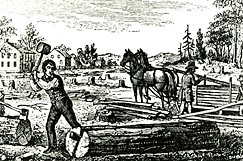America was with no doubt the land of opportunity. The New World was where Europeans could flee crowded and impoverished cities for unexplored lands, jobs and what they thought would be success. Voltaire's
Candide shows how people in Europe saw America as a way of running away from their mistakes or miseries in Europe. Pangloss earlier in the book explains that although he had been infected with syphilis, an American disease, he didn't think it was bad because the fact that colonizers had gone to America and gotten syphilis introduced Europeans with the wonders of the colonies. Voltaire most likely was mocking his illogical reasoning and that people in Europe were tricked into believing that America was great. Later on the book, Candide, Cunégonde and the old woman decided to escape from Portugal to Argentina as they had killed the Issachar and the Great Inquisitor. They not only failed to run away, as the Portuguese authorities caught up with them, but Candide ended up in a worse situation. As a fugitive again, Candide ran away from Buenos Aires to join rebels in Paraguay, and ended up killing Cunégonde's brother. Candide is clearly very unfortunate, but he represents the typical case of a European seeking a better life in the Americas and failing. Through Voltaire's satire I concluded that America, instead of a land with the best of Europe, for many wad a land with the worst of Europe. In Candide case, the wars continue, they couldn't escape their crimes (which is actually good), Cunégonde gets taken away from Candide, and her family's disapproval towards him get worse. Although many of the immigrants to the Americas eventually ended up in a good situation, most of them were victims of what people nowadays would call deceptive marketing.
People believed that the New World was a better world, and were wrong, because of many reasons, but one of them, probably one of the most important ones was the first impression they got of it. The Spanish were smart enough to name their colonies in a way that people back Spain would want to go to America. By having more people in their colonies they could further colonize them, by being able to protect their lands and have more power on the region. Places like Rio de la Plata, Puerto Plata, Puerto Rico, Buenos Aires, among many others were clearly a way colonizers tricked the Old World into falling for the idea of a land of opportunity. I guess immigrants imagined Buenos Aires as an inspiring city, inside the viceroyalty of Rio de la Plata, where they could grow rich with silver. Others were simply mesmerized by the idea of a rich island. Other places were named after cities or regions in the Old World. Immigrants thought they were going to a better version of their homelands, like New Spain or New Granada. Instead that found themselves in undeveloped, feudal, violent and isolated jungles.
How they thought live would be:




Alberto,
ReplyDeleteFirst of all, I would like to say that I found your blog entry to be very interesting and original.
What you say about Voltaire criticizing the false hopes with which people ventured into the new world may be true but I believe that the role that America plays in Candide is to present (and afterwards disqualify) the existence of the “best of all worlds” described by Pangloss. Also, I believe the pictures you included in your blog are misleading and confusing because three of them denounce issues that occurred long after Voltaire’s time and are not apt for an analysis of Candide, being more in the line of something like The Grapes of Wrath.
Alfredo,
DeleteIt is true that some of the images are from times much later than that of Voltaire but they still represent the false idea of the wonders of the New World. In the book the only place where things work out for Candide, and life seems to be fair, is El Dorado, an utopia, imaginary by definition. Voltaire contrasts the flaws of the real world with the imaginary society to show that real life is not perfect. He, therefore, implies that the New World is not good either, and that the idea that it good, is not real. You say that America plays the existence of the "best of worlds," but what does isn't truly America, it is a utopia. Candide continues to suffer from miseries in the New World, as Voltaire mocks Europeans who went to America looking for a better future.